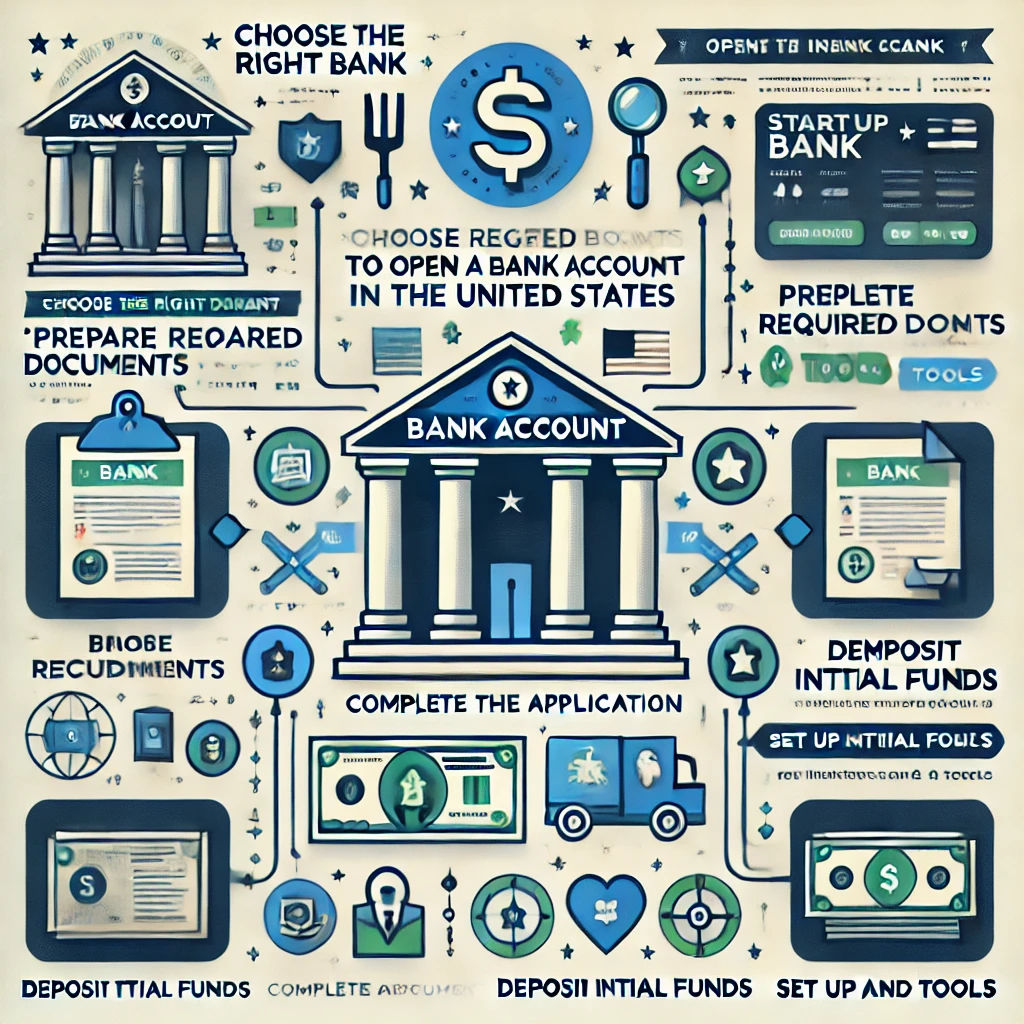How to Open a Startup Bank Account in the United States of America: A Step-by-Step Guide
Welcome to the Texas Startup Ecosystem!
Congratulations on taking the exciting first steps toward building your dream startup in Texas. Known for its dynamic entrepreneurial environment and robust economy, Texas offers countless opportunities for new businesses to thrive. One of the first—and most critical—steps in your journey is opening a business bank account.
With a multitude of options, navigating Texas’ banking landscape can feel daunting. But don’t worry—Texas Startup Insider is here to simplify the process and help you find the best fit for your startup’s needs.
Why You Need a Business Bank Account
A business bank account is not just a formality; it’s a necessity. Here’s why:
- Legal Compliance: Keeps your personal and business finances separate, which is essential for legal and tax purposes.
- Professionalism: Makes your startup look credible to clients, investors, and partners.
- Financial Management: Simplifies tracking income, expenses, and cash flow.
- Access to Financial Tools: Enables payroll, credit, and merchant services integration.

Opening a bank account as a startup founder in the United States of America – Texas Startup Insider News Magazine
Types of Business Bank Accounts in Texas
- Business Checking Accounts
The backbone of your startup finances. These accounts allow you to:- Handle daily transactions (e.g., deposits, withdrawals, transfers).
- Make payments to vendors or employees.
- Link with payroll systems or invoicing software.
Average monthly fees: $10–$30 (may be waived with minimum balances).
- Business Savings Accounts
Ideal for building an emergency fund or saving for planned expenses while earning modest interest.
Pro Tip: Look for banks offering competitive interest rates or tiered savings options for growing startups. - Merchant Services Accounts
If your business accepts credit or debit card payments, you’ll need this type of account to process transactions.
Watch out for: Processing fees that vary by provider, often ranging from 1.5% to 3% per transaction.
Texas Banks: Options for Every Budget and Business Type
Whether you’re bootstrapping or backed by venture capital, there’s a Texas banking solution for you. Here’s a quick guide:
- National Banks
Examples: Chase, Bank of America, Wells Fargo.
Strengths: Broad accessibility, robust online banking, and extensive service options.
Considerations: Higher minimum balances and fees may apply. - Regional Banks
Examples: Frost Bank, Texas Capital Bank.
Strengths: Local expertise, personalized service, and potentially lower fees. - Online Banks
Examples: Bluevine, Mercury.
Strengths: Competitive rates, no physical branch overhead, and streamlined applications.
Considerations: Limited in-person services and cash handling capabilities. - Credit Unions
Examples: Patelco Credit Union, Randolph-Brooks Federal Credit Union.
Strengths: Lower fees, member-focused service, and potential dividends on accounts.
Considerations: Membership requirements may apply.
Documentation: What You’ll Need to Open a Business Bank Account in Texas
For U.S. Citizens and Residents:
- Government-issued ID (e.g., driver’s license, passport).
- Social Security Number (SSN) or Employer Identification Number (EIN).
- Business formation documents (e.g., Articles of Incorporation, LLC Operating Agreement).
- Proof of business address (e.g., utility bill, lease agreement).
For Non-U.S. Citizens:
- Valid visa documentation or Employment Authorization Document (EAD).
- Proof of address in Texas.
- Business formation documents.
Key Considerations When Choosing a Bank
- Minimum Balance Requirements:
Opt for accounts with reasonable balance thresholds to avoid monthly fees. - Transaction Limits:
Evaluate how many free transactions (deposits, withdrawals, transfers) the bank allows each month. - Foreign Transaction Fees:
If you plan to conduct international business, ensure your bank offers competitive rates for global transactions. - Integrations and Tools:
Look for accounts that integrate with accounting platforms, payroll software, and merchant tools.
Texas Business Insights: Why a Bank Account Matters
- Texas is home to over 2.4 million small businesses, employing more than 8.3 million workers, according to the SBA.
- Many startups fail due to poor financial management. A well-chosen business bank account can help streamline operations and manage cash flow effectively.
Quick Tips for Entrepreneurs
- Compare promotional offers: Many banks offer perks for startups, such as fee waivers or introductory bonuses.
- Prioritize customer service: Accessible and responsive service can save time when problems arise.
- Research online reviews: Fellow entrepreneurs’ experiences can provide valuable insights into a bank’s reliability.
Step-by-Step Checklist for Opening a Business Bank Account
- Choose the Right Bank: Compare options based on fees, services, and accessibility.
- Prepare Your Documents: Gather your ID, EIN, and business formation documents.
- Complete the Application: Fill out the application online or at a branch.
- Deposit Initial Funds: Ensure you meet the minimum deposit requirements.
- Set Up Your Account: Link your account with accounting tools, payroll, and other services.
FAQs About Opening a Business Bank Account in Texas
Q1: Can I open a business bank account without an SSN?
A1: Yes, if you have an EIN and valid visa or work authorization documents, you can open a business account.
Q2: Which Texas banks offer startup loans with business accounts?
A2: Many banks in Texas offer business loans, lines of credit, and other financial products tailored to startups. Research options based on your needs.
Texas Startup Insider: Your Trusted Guide to Startup Success
At Texas Startup Insider, we understand the complexities of launching a business. That’s why we’re dedicated to empowering Texas entrepreneurs with actionable advice and resources tailored to your needs.
Ready to open your startup’s bank account and build your Texas dream?
Visit our Resource Section for curated bank reviews, expert tips, and up-to-date recommendations.
Stay tuned for exclusive interviews, guides, and success stories from the heart of the Texas startup ecosystem.
Start smart, grow fast, and let Texas Startup Insider be your partner every step of the way.
Disclaimer
This article provides general information and should not be construed as financial, legal, or professional advice. The content is based on current knowledge and industry trends but may not be applicable to all situations. Always conduct thorough research and consult with qualified professionals before making any financial decisions.






